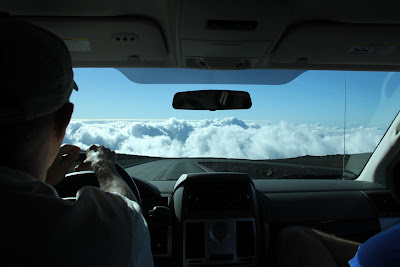- All things come into being through opposition, and all are in flux like a river.
- We must know that war is common to all and strife is justice, and that all things come into being and pass away through strife.
- This world-order, the same for all, no god made or any man, but it always was and is and will be an ever-living fire, kindling by measure and going out by measure.
- Before you play with fire, whether it be to kindle or extinguish it, put out first the flames of presumption, which overestimates itself and takes poor measure because it forgets the way the world unfolds before you.
- Man is kindled and put out like a light in the nighttime.
The notion that reality is in flux and the motive cause of this flux is strife is an insight that became the backbone of G.W.F. Hegel's (1770-1831) systematic philosophy: the dialectic. His methodological insight is often shorthanded as thesis::antithesis::synthesis. In his Logic §§ 132-34, he resolves the antithetical notions of Being and Nothingness into Becoming [a notion metaphorized as skiing by Sartre in an earlier post].
"[Thesis:] Being, pure being, without any further determination. In its indeterminate immediacy it is equal only to itself. It is also not unequal relatively to an other; it has no diversity within itself nor any with a reference outwards. It would not be held fast in its purity if it contained any determination or content which could be distinguished in it or by which it could be distinguished from an other. It is pure indeterminateness and emptiness. There is nothing to be intuited in it, if one can speak here of intuiting; or, it is only this pure intuiting itself. Just as little is anything to be thought in it, or it is equally only this empty thinking. Being, the indeterminate immediate, is in fact nothing, and neither more nor less than nothing.
"[Antithesis:] Nothing, pure nothing: it is simply equality with itself, complete emptiness, absence of all determination and content — undifferentiatedness in itself. In so far as intuiting or thinking can be mentioned here, it counts as a distinction whether something or nothing is intuited or thought. To intuit or think nothing has, therefore, a meaning; both are distinguished and thus nothing is (exists) in our intuiting or thinking; or rather it is empty intuition and thought itself, and the same empty intuition or thought as pure being. Nothing is, therefore, the same determination, or rather absence of determination, and thus altogether the same as, pure being.
"[Synthesis:] Pure Being and pure nothing are, therefore, the same. What is the truth is neither being nor nothing, but that being — does not pass over but has passed over — into nothing, and nothing into being. But it is equally true that they are not undistinguished from each other, that, on the contrary, they are not the same, that they are absolutely distinct, and yet that they are unseparated and inseparable and that each immediately vanishes in its opposite. Their truth is therefore, this movement of the immediate vanishing of the one into the other: becoming, a movement in which both are distinguished, but by a difference which has equally immediately resolved itself."Being flows into Nothingness, and Nothingness flows into Being. They find their unity in Becoming.
We also recognize Heraclitus in the dialectical materialism in Vol. 1 of The Capital (1873) of Karl Marx (1818-1883) developed under the direct influence of and in oppositional tension to Hegel's progressive idealism:
"[Dialectical Materialism] includes in its comprehension an affirmative recognition of the existing state of things, at the same time, also, the recognition of the negation of that state, of its inevitable breaking up; because it regards every historically developed social form as in fluid movement, and therefore takes into account its transient nature not less than its momentary existence; because it lets nothing impose upon it, and is in its essence critical and revolutionary."Thus, from Heraclitus, through Hegel, and via Marx, we understand how a dialectical philosophical system seeks to incorporate into itself the contradictions of a recalcitrant Reality. The end point of the project of the Enlightenment (in both its rational and empirical forms) is the comprehensive, totalizing system.
This methodological insight, notwithstanding the terrors of the 20th Century playing out of these views in the political sphere, is a tacit recognition of the changing nature of Reality, both in thought and history. Hegel and to a lesser extent Marx believed the struggle was progressive. For Marx, it was Revolutionary. Hegel's principle interest, though, was to preserve the System. Marx's to resolve the class struggle.
Again: Flux. Opposition. Strife. Coming into being. Extinguishment.
Looking past their interests (for Hegel: idealism, progressive Statism, the System of thought) and ideologies (for Marx: class struggle, Stateless communism), we glean an insight into the truth of Reality (both subjective and objective) both men seem to have appreciated: that is, of Reality as ever-changing, in the flux of constant strife. Hegel and Marx sought to capture this recognition philosophically, politically, economically, and sociologically. As such they represent the first (Western) attempts to approximate an insight into the mechanisms of Heraclitean flux into a coherent philosophical approach to understanding the nature of Reality.
---------
[apologies. i'm feeling Stereolab today.]





























